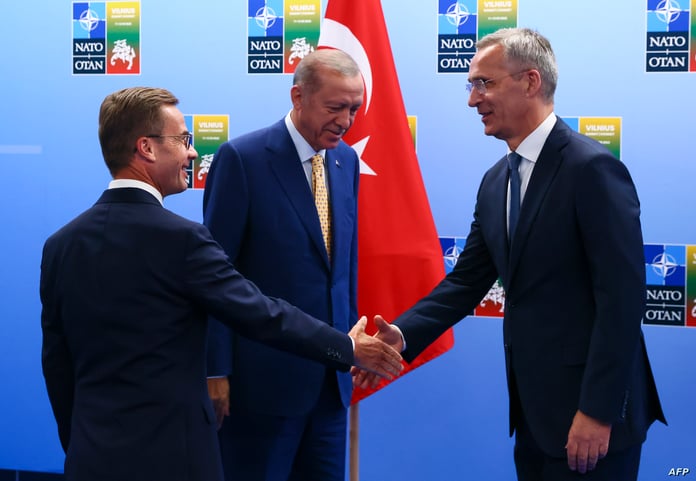Vilnius, Lithuania – In a surprising move, Turkish President Recep Tayyip Erdogan put forward a contentious “barter” proposition, which he later withdrew, on the eve of the NATO leaders’ summit in Vilnius, Lithuania. The proposal involved Türkiye’s membership in the European Union in exchange for not vetoing Sweden’s accession to NATO. While Erdogan’s request has become virtually impossible, it has sparked debate regarding the underlying motives for his provocative stance.
According to Marc Perini, a Senior Fellow at the Carnegie Europe Center specializing in the Middle East and Turkey, Erdogan’s proposal constitutes “unworthy blackmail.” Perini asserts that the Turkish President’s behavior within multilateral organizations, such as NATO, serves as evidence that he is an unreliable ally. Despite Erdogan’s eventual agreement to support Sweden’s NATO membership, the United States and its European allies are increasingly skeptical of his trustworthiness.
Prior to Erdogan’s change of heart, Turkey had been blocking Sweden’s entry into NATO, accusing Stockholm of harboring Kurdish activists deemed terrorists by Ankara. The contentious relationship between Turkey and the EU has deep-rooted reasons, making the prospect of Türkiye’s inclusion in the European Union a contentious issue.
Turkey’s aspirations to join the European Union date back to 1987 when the country applied for membership in what was then known as the European Economic Community. Despite being declared eligible in 1999, Turkey’s path to EU membership has been fraught with challenges. Factors such as a significant economic disparity, strained relations with Cyprus and Greece, and the collapse of the Soviet Union have impeded Turkey’s progress towards accession.
To meet the Copenhagen criteria, a set of standards determining a country’s eligibility for EU membership, Turkey was expected to implement substantial reforms in areas such as democracy, human rights, the rule of law, minority protection, and the development of an open market economy. While accession negotiations commenced in 2005, eight chapters of the negotiations have remained closed due to Turkey’s refusal to apply the Additional Protocol to the Ankara Association Agreement on Cyprus.
Turkey’s bid for EU membership faced additional setbacks due to domestic and international events. The political climate in Turkey shifted after the failed coup attempt in July 2016, prompting Erdogan to consolidate power. The 2017 referendum that expanded the President’s executive authority further strained Ankara’s relationship with the EU. In 2018, accession negotiations were suspended due to Turkey’s retreat in key areas such as the functioning of the democratic system, respect for fundamental rights, and the independence of the judiciary.
Erdogan’s long-standing grievances towards Europe, combined with his authoritarian tendencies, have hindered Turkey’s progress toward EU membership. The Turkish President’s aggressive rhetoric, including threats to reinstate the death penalty and send refugees to Europe, has exacerbated the strained relations between Turkey and the EU. Consequently, Erdogan himself has become the biggest obstacle to Türkiye’s inclusion in the European Union.
Analyzing Erdogan’s proposal to conditionally support Sweden’s NATO accession, Taha Oud Oglu, a researcher in Turkish and international relations, suggests that the Turkish President aimed to leverage this position to strengthen Turkey’s relationship with the United States rather than Europe. Oud Oglu asserts that Erdogan’s recent reelection has emboldened him to utilize Turkey’s EU accession as a bargaining chip to achieve regional and domestic interests. By garnering attention and controversy at the NATO summit, Erdogan succeeded in putting the issue in the spotlight and sparking discussions among Western countries.
The timing of Erdogan’s proposal is also significant, particularly in its targeting of Washington. With the US Congress linking the sale of F-16 fighter jets to Turkey with Sweden’s NATO accession, Erdogan seeks concessions from the United States. Additionally, he aims to influence issues related to the Syrian Democratic Forces (SDF), a group Turkey opposes.
While Erdogan’s negotiation tactics may be strategic, his proposal has failed to gain traction or alter the trajectory of Turkey’s relationship with the EU. The European Union remains skeptical of Erdogan’s commitment to democratic values and human rights, reinforcing the belief that Turkey’s EU membership is still a distant goal.
In conclusion, Erdogan’s proposal to conditionally support Sweden’s NATO membership in exchange for Türkiye’s inclusion in the European Union has raised questions about Europe’s rejection of Ankara’s accession. The strained relationship between Turkey and the EU, coupled with Erdogan’s authoritarian tendencies, has hindered progress towards EU membership. While Erdogan’s proposal served as a strategic move to gain attention and influence international relationships, it ultimately failed to sway the European Union. The future of Türkiye’s EU membership remains uncertain, with Erdogan himself being the primary obstacle to its realization.


